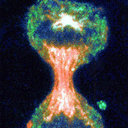Standard versus continuous administration of capecitabine in metastatic breast cancer (GEICAM/2009-05): a randomized, noninferiority phase II trial with a pharmacogenetic analysis.
Keywords
Abstract
BACKGROUND
The approved capecitabine regimen as monotherapy in metastatic breast cancer (MBC) is 1,250 mg/m(2) twice daily for 2 weeks on and 1 week off (Cint). Dose modifications are often required because of severe hand-foot syndrome (HFS). We tested a continuous regimen with a lower daily dose but a similar cumulative dose in an attempt to reduce the severity of adverse events (AEs) while maintaining efficacy.
METHODS
We randomized 195 patients with HER-2/neu-negative MBC to capecitabine 800 mg/m(2) twice daily throughout the 21-day cycle (Ccont) or to Cint to assess noninferiority in the percentage of patients free of progression at 1 year. Secondary endpoints included efficacy and safety. Associations between polymorphisms in capecitabine metabolism-related genes and drug response were assessed.
RESULTS
The percentage of patients free of progression at 1 year was 27.3% with Cint versus 25.3% with Ccont (difference of -2.0%; 95% confidence interval: -15.5% to 11.5%, exceeding the 15% deemed noninferior). Differences regarding other efficacy variables were also not found. Grade 3-4 HFS was the most frequent AE (41.1% in Cint vs. 42.3% in Ccont). Grade 3-4 neutropenia, thrombocytopenia, diarrhea, and stomatitis were more frequent with Cint. A 5' untranslated region polymorphism in the carboxylesterase 2 gene was associated with HFS. One polymorphism in cytidine deaminase and two in thymidine phosphorylase were associated with survival.
CONCLUSIONS
Our study was unable to show noninferiority with the continuous capecitabine regimen (Ccont) compared with the approved intermittent regimen (Cint). Further investigation is required to improve HFS. Polymorphisms in several genes might contribute to interindividual differences in response to capecitabine.



